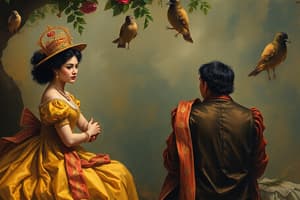Podcast
Questions and Answers
What is politics according to Heywood (2012)?
What is politics according to Heywood (2012)?
- Linked only to cooperation, not conflict
- Not linked to social interactions
- A solitary activity that emerges only from the arrival of man (or woman)
- A diverse social activity that arises from disagreements (correct)
What does Philippine political culture refer to?
What does Philippine political culture refer to?
- A pattern of orientations expressed in beliefs, symbols, and values (correct)
- Cultural practices unrelated to politics
- Psychological orientations towards daily life activities
- Recent political trends in the Philippines
When did interests in political culture begin to emerge according to the text?
When did interests in political culture begin to emerge according to the text?
- Between the 1950s and 1960s (correct)
- During the 1940s
- In the early 2000s
- In the 1800s
How is culture defined in its broadest sense?
How is culture defined in its broadest sense?
What did political thinkers agree on regarding beliefs and values?
What did political thinkers agree on regarding beliefs and values?
Why did interests in political culture emerge in the 1950s-1960s according to the text?
Why did interests in political culture emerge in the 1950s-1960s according to the text?
What is the term used to describe the process whereby citizens develop values, attitudes, beliefs, and opinions that enable them to support the political system?
What is the term used to describe the process whereby citizens develop values, attitudes, beliefs, and opinions that enable them to support the political system?
Which of the following is NOT a characteristic of the Unbending family ties aspect of Philippine politics?
Which of the following is NOT a characteristic of the Unbending family ties aspect of Philippine politics?
What is the main issue arising from the lack of clear ideological separation between political parties in the Philippines as mentioned in the text?
What is the main issue arising from the lack of clear ideological separation between political parties in the Philippines as mentioned in the text?
'Machismo' in Philippine politics refers to a belief that:
'Machismo' in Philippine politics refers to a belief that:
What is one implication of the culture of dependence discussed in the text?
What is one implication of the culture of dependence discussed in the text?
According to Magstadt and Schotten, what does political socialization enable individuals to do?
According to Magstadt and Schotten, what does political socialization enable individuals to do?
Flashcards are hidden until you start studying
Study Notes
Definition of Politics
- Politics, as defined by Heywood (2012), involves the process of making collective decisions and the distribution of power and resources within society.
Philippine Political Culture
- Philippine political culture refers to the values, beliefs, and practices that influence political behavior and governance in the Philippines.
Emergence of Interest in Political Culture
- Interests in political culture began to emerge in the 1950s and 1960s, driven by increasing recognition of the role culture plays in shaping political systems.
Broad Definition of Culture
- Culture is broadly defined as a set of shared attitudes, values, practices, and beliefs that characterize a group or society.
Political Thinkers on Beliefs and Values
- Political thinkers generally agree that beliefs and values are fundamental to understanding political behavior and the functioning of political systems.
Reasons for Interest in Political Culture in the 1950s-1960s
- The post-World War II period prompted a focus on political culture as scholars sought to understand how cultural factors influenced political stability and change.
Political Socialization
- The term "political socialization" describes the process whereby individuals develop values, attitudes, beliefs, and opinions that enable them to support the political system.
Characteristic Exclusion of Unbending Family Ties
- Among the characteristics associated with Unbending family ties in Philippine politics, a focus on institutional integrity is NOT included.
Main Issue of Ideological Overlap
- The lack of clear ideological separation between political parties in the Philippines results in political ambiguity, making it difficult for voters to identify distinct party platforms.
'Machismo' in Philippine Politics
- 'Machismo' refers to a cultural belief in traditional male dominance, influencing power dynamics and gender roles within Philippine political contexts.
Implication of the Culture of Dependence
- The culture of dependence can lead to limited self-reliance among citizens, fostering reliance on patronage and hindering democratic accountability.
Political Socialization Enablement
- According to Magstadt and Schotten, political socialization enables individuals to participate more effectively in political processes by equipping them with necessary knowledge and civic values.
Studying That Suits You
Use AI to generate personalized quizzes and flashcards to suit your learning preferences.




